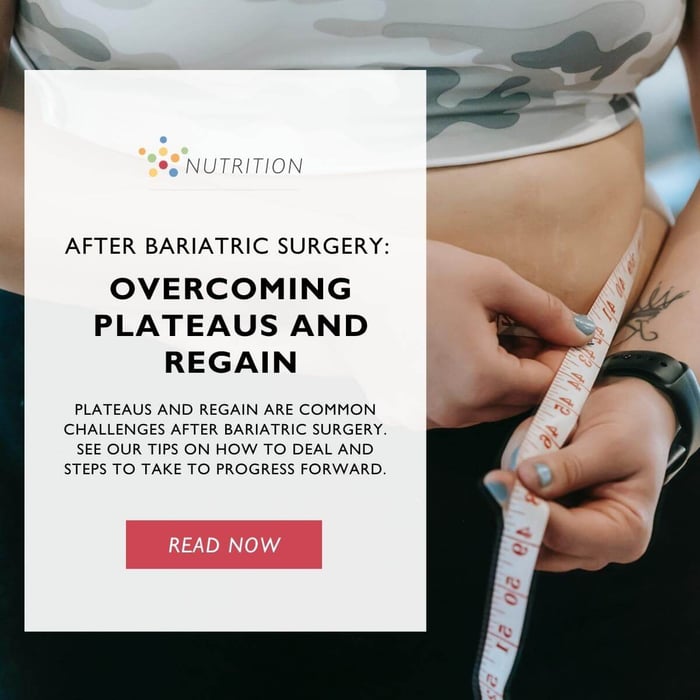Collagen After Bariatric Surgery
 Dr. Samantha Stavola-Giaconia DCN, RDN, LD, FAND
Lifestyle
Dr. Samantha Stavola-Giaconia DCN, RDN, LD, FAND
Lifestyle
March 30th, 2023

Bariatric surgery can be a life-changing procedure for those who struggle with obesity and its related health problems. However, weight loss surgery can also result in significant changes to the body, including changes to the skin and other connective tissues. Collagen, a protein that provides structure and elasticity to the skin, can be particularly affected by bariatric surgery.
In this blog post, we'll explore the role of collagen in the body, how bariatric surgery can impact collagen production, and what steps you can take as weight loss surgery patients to support collagen synthesis and maintain healthy skin after weight loss surgery.
Why Protein is Necessary
Of all the macronutrients, protein intake is especially emphasized after bariatric surgery. While the general public typically meets or exceeds protein recommendations, patients who have undergone bariatric surgery face challenges meeting these recommendations. “Protein First” has become a mantra that dietitians teach their patients to encourage adequate intake and avoid protein malnutrition and its associated complications.
What is Collagen
Collagen is the most abundant protein in the body. It is a hard, fibrous protein that makes up one-third of all protein in the human body. It gives structure to our hair, skin, nails, bones, ligaments, and tendons. Thanks to natural collagen formation, we’re better able to move, bend, and stretch.

Why is Collagen Important
In the skin, collagen serves as a base for new cells to grow, and it replaces and restores dead skin. Some collagen serves as a protective covering for organs. While we age, the production of collagen decreases, wrinkles form, and joint cartilage weakens. Collagen can be broken down, converted, and absorbed back into the body. Adding a serving of collagen, through high protein foods or supplementation, to your diet may help ease joint pain, reverse skin aging, build muscle, strengthen hair and nails, and improve digestive health. Collagen peptides are comprised of short chain amino acids which are not complete proteins. Bariatric surgery patients should not count the protein contained in collagen supplements towards their daily protein goals because collagen does not contain essential amino acids.
Why is Hydrolyzed Collagen Important?
Hydrolyzed Collagen Peptides are easy for the body to absorb. It makes up connective tissue, like skin, tendons, cartilage, organs, and bones. The collagen is reduced to smaller peptides, making it available quickly to the bloodstream. From the bloodstream, it is transported to key areas to be used as a building block for cells, and this may increase the production of new collagen.
Collagen Supplements:
- May reduce joint pain
- Support hair, skin, and nails
- May strengthen the digestive tract
- Help aid in the healing process

Formulation
There are at least 16 different types of collagen protein. Each type has a different structure and function. 80-90% of collagen products are made up of Types I, II, and III.
Type I Collagen
- Found in skin, tendons, ligaments, bones, teeth, and between organs
- Maintains and rebuilds muscle, eyes, bones, and spine
- Minimizes fine lines and wrinkles, improves skin elasticity and hydration
- Makes nails stronger and hair thicker
- Aids in healing gut lining and intestinal tract
Type III Collagen
- Found in skin, muscles, and blood vessels
- Second most abundant form of protein in the body
- Excellent for gut healing and skin elasticity
In Conclusion
Collagen makes up so make critical components of our bodies, making it essential to overall well-being.
To begin a new collagen supplement, start with 1-2 servings daily. Collagen can be used in many ways: smoothies, shakes, baked goods, and other beverages.
Collagen Smoothie

- 1 cup almond milk
- 1 cup ice
- ½ banana
- 1/2c frozen blueberries
- 2 TBSP cacao powder
- 1 scoop Celebrate Renew Collagen Peptides
Blend ingredients together in blender.
Collagen Hot Chocolate

- 1.5 c milk or milk alternative
- 1 TBSP cocoa powder
- 1-2 scoops Celebrate Renew Cocoa Collagen Peptides
- ¼ tsp cinnamon
- Optional toppings: whipped cream, marshmallows
Whisk ingredients together in saucepan on stovetop over medium heat until boil. Pour into favorite mug, add toppings, and enjoy!
Hair, Skin & Nails Vitamin Capsules

$22.99
Our Hair, Skin, and Nails is a robust formula that includes biotin, iron, zinc, and copper which all play a critical role in the support of healthy hair, skin, and nail health after bariatric surgery. It also includes other specialty… read more



